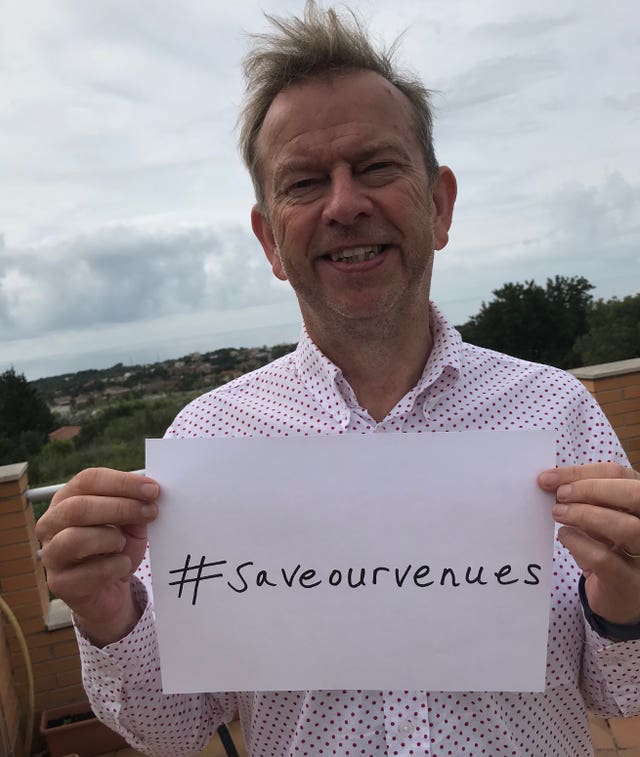Frank Turner has warned that a delay to the end of lockdown will tip some music businesses into “final collapse”.
The singer-songwriter, who is a patron of the Music Venue Trust, said the expected announcement of a four-week extension of coronavirus restrictions in England is “disheartening”.
In a thread on Twitter, Turner described the impact a delay will have on the live music sector, which has been preparing for a June 21 restart at full capacity.
So it looks like the lifting of social restrictions here in the UK is going to be pushed back again today. It’s disheartening, but it is what it is. A quick thought tho. THREAD.
— Frank Turner (@frankturner) June 14, 2021
Despite restrictions easing, many venues have not reopened with socially distanced audiences because of financial uncertainty.
Turner, 39, wrote: “So it looks like the lifting of social restrictions here in the UK is going to be pushed back again today. It’s disheartening, but it is what it is. A quick thought tho.
“I’m not an epidemiologist, and I’m not here to argue the medical/scientific side of things. It may well be this is the right thing to do. A small point I feel bound to make is this:
“A *lot* of people are loudly asking the question ‘What’s the big deal? How much of a difference does a 4 week delay (or whatever) make?’ And the answer to that is, for some of us, a lot.
“Some people, as far as I can tell, are not far off being back to living their normal lives. And that’s great, I’m happy for them. Some of us really, really aren’t.
“The delay is going to tip some businesses into final collapse. It’s another blow to morale, another financial loss, after an appalling year and more.
“That’s just in my industry, live music. There are many more affected by this.”

Turner, from Meonstoke, Hampshire, said the last weeks have been “about the hardest part of the whole shebang” with regards to “mental health, morale and economics”.
He continued: “But like millions of others I’ll do my best to work it out. We’ll reschedule, do the sums again, thank the gods for people like @musicvenuetrust, and hope against hope something will be left on the other side of this.”
Turner said that saying “it’s not a big deal” is “pretty parochial”, adding: “I’m glad it doesn’t affect you, but it does affect us, and a little consideration of that would be appreciated. Hope everyone’s doing OK.”
In July last year, Turner performed at the Clapham Grand in south London in front of a socially distanced audience as part of the Government’s live events pilot scheme.
Ally Wolf, manager of the venue, said: “If they expect us to work with it without (financial support) then they are going to have job losses, businesses will close, landlords will repossess venues.
“All of the doom and gloom that has surrounded this industry up until the initial date was put into place will return incredibly quickly because we are on a knife edge.
“I am watching half my diary disappear and I am rescheduling shows. How am I going to pay the bills in two weeks’ time if these seven events that would have brought in over 8,000 customers are now moved back? What I am I now going to do that week?”

Chi-chi Nwanoku, founder and artistic director of the Chineke! Orchestra, the first professional orchestra in Europe to be made up of majority black, Asian and ethnically diverse musicians, said they had become increasingly resilient during the pandemic and were looking forward to performances, socially distanced or not, in the coming months.
She told PA: “We are so resilient and so used to finding our way. We have had a lot of practice at it over the last year and a half.”
Nwanoku added: “Doing that concert on the 28th of May at the Royal Festival Hall with 750 people in the audience, oh my goodness. We walk out on stage as a full orchestra together – that is what Chineke! does. Nobody sits down before. Even the conductor walks out with us together at the start of a concert, and the audience were just exploding with joy and emotion, to be in that live space again.”
Speaking about the orchestra’s response to the pandemic, she added: “People of colour are used to having to figure out how to get around barriers and blockages because it is a daily activity for us in some ways.”
Greg Parmley, chief executive of trade body LIVE, said the delay will have a “seismic impact” on the sector.
He told the PA news agency: “Our initial estimates show that a delay of up to a month would lead to the cancellation of around 5,000 planned events. That’s everything from festivals to grassroots music gigs.
“We think it will cost the industry tens of millions of pounds and take work from thousands of people who have been without it for more than a year now. It is a seismic impact on the whole sector.”
Parmley said some festivals have already taken staff off furlough and begun constructing their sites ahead of the June 21 deadline.
“To have the rug pulled from under our feet like this at the 11th hour is extremely devastating,” he added.

Parmley called for the Government to publish its report into live events, which gathered data at pilot concerts including the Brit Awards at London’s O2 Arena and a festival at Sefton Park in Liverpool.
He said: “We think it is completely unacceptable that this document is so critical to the discussion around the reopening of live events but it is not being made public.
“We would really like it to be published now so we can see on what basis the Government is making decisions about the future off our industry.”

Mark Davyd, founder and chief executive of the Music Venue Trust, called on the Government to provide additional financial support to music businesses hit by the delay.
He told PA: “We need the Government to act immediately because millions of pounds have gone into this sector to prevent it from closing down.
“We are apparently going to be four weeks away from when we might be able to reopen. But in those four weeks most of these venues could be closed down because they are unable to pay their bills.”
Davyd called on the Government to “repurpose” money from the third round of the Culture Recovery Fund to give businesses support during the delay.
He added: “For layman’s terms, it really is as simple as just imagining trying to pay your bills for 15 months with no money whatsoever.
“Even if you have managed to do that, even if you have managed to get to this point, think about the amount of money you now owe people and the promises you have made to them about when you might be able to start paying them.
“Imagine you have to keep going back to them and explaining why you can’t do that. It’s no surprise to us that landlords and freeholders have run out of patience.”
